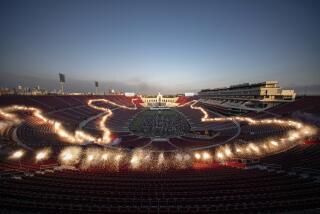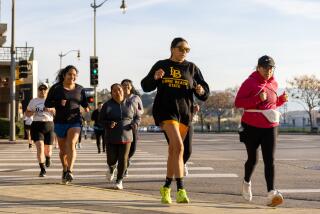Boston Marathon runners horrified, confused
- Share via
BOSTON — The first explosion sounded like it could have been loud thunder — except that it was a beautiful spring day, not a cloud in the sky. Then came the second, a smell of sulfur, and the screams of the injured and the frightened as blood streaked the finish line of the nation’s most famous marathon.
“I had literally just stepped on the finish line when ... I heard the explosion,” said Lorraine Bubar, 61, a Los Angeles artist running her first race. “Instantly, I was like, ‘Oh my God, a bomb.’”
Injured people and body parts lay on the street. Volunteers ran toward the course and ripped apart metal barriers so that runners and spectators could escape. Many people fled in wild panic; others cried out for missing companions amid the smoke and the fear that more mayhem was coming.
Farther down the route, exhausted runners anticipating a joyous reunion with friends and family at the race’s end instead found themselves swept up in a tide of terror and confusion, uncertain where to go or what might have happened to loved ones waiting for them near the site of the bomb blasts.
“We weren’t told what happened. Just that the marathon was stopping and we can’t run anymore,” said Travis Grodkiewicz, 23, of New Jersey.
Veteran runners Richard Carling, 75, and Steve Coffman, 65, running their 35th and 36th Boston Marathons respectively, were about a mile from the end when a man came running the wrong way down the course toward them, screaming that there had been an explosion.
The two men began trying to call their wives, who were waiting for them at the finish, but could not reach them right away.
“Both of us kind of panicked,” said Carling, of Salt Lake City.
In the end, their wives were fine — but three other people were killed and scores were injured, with many losing limbs. Witnesses described a horrific scene. Maya Hauer, 23, who was watching the finish line from a third floor office on Boylston Street, said she saw blood, shattered glass, and, just before she fled, a lone leg that had been blown off in the blast.
Many saw a stark irony in the carnage, given that runners began the race with a moment of silence for the victims of the Newtown shooting massacre. At the 26-mile marker, just 0.2 miles from where someone had placed the deadly bombs, there was a memorial of 26 stars, representing the victims at Newtown, along with the city seal.
As the race began, the 117th Boston Marathon offered its 27,000 runners near perfect conditions. It was sunny but cool, and the morning was bright and celebratory after days of gloomy weather. Then, about five hours into the race, powerful blasts rang out, first one and then, 13 seconds later, a second.
Jessica Spence was a half-mile from the finish line when she saw about a half-dozen police offers running at her and other runners. The police were jabbing their fingers in the air, yelling at them to turn around.
“I didn’t know what was going on,” said Spence, 30, who was running her first Boston marathon.
Nearby, at the 26-mile marker, her parents were waiting for her to run by when they felt the explosions.
“Everybody just started running — stampeding,” Richard Spence, 52, said.
Spectators jumped metal barriers and began running against the oncoming marathoners, he said. Frantic, he and his wife began looking for their daughter, hoping she was unharmed, he said. They texted and tried calling too, but to no immediate avail.
The chaos was amplified because of the circumstances: Many runners, clad only in light outfits, had no cellphones. Even those who did found the cell networks overloaded in the aftermath of the explosions.
“The runners seemed confused, and slowly, panic started to set in,” said Samantha Bissonnette, 22, a senior at Tufts University, who had been cheering friends on about half a mile from the finish line when she heard the blasts.
She was next to a woman and her daughter, who was crying because she could not find her father, who had been on the course.
Finally, they found him. He picked up his daughter and began to weep, Bissonnette said.
Ajay Zutshi, a 42-year-old runner from Brookline, Mass., said he did not at first understand what had happened. “Some girl was crying. She was a bystander. And some runner started crying beside me. I thought that was kind of weird,” he said.
He continued to run until he hit a blockade.
As runners and spectators on the course began to grasp what had happened, people began to pull together. Residents living along the route came out of their homes to offer food and phones for people to make calls.
By nightfall, the streets of downtown Boston were empty but for a constant stream of police vehicles.
Bruce Chorpita, a professor of clinical psychology at UCLA who finished the race before the bombs went off, said the view from his hotel window Monday night was “spooky.”
“There were 100,000 people out there four or five hours ago, now it’s deserted,” he said, adding that the hotel was still on lockdown.
Hours later, safe in a hotel with all her friends and family accounted for, Bubar, the Los Angeles artist running her first Boston Marathon, was struck by the contrast between the beauty of the day and the horror she had witnessed.
The race, she said, draws “people from all around the world. Like a tribute to people coming together, and it ended in a horrible, completely unexpected tragedy.”
Xia and Reston reported from Los Angeles. Times staff writer Jessica Garrison in Los Angeles contributed to this report.
More to Read
Sign up for Essential California
The most important California stories and recommendations in your inbox every morning.
You may occasionally receive promotional content from the Los Angeles Times.













